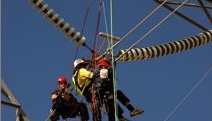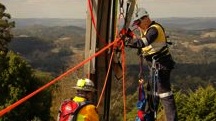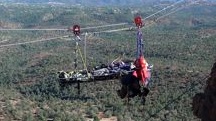The Mountain Rescue Workshop is a minimalist approach to mountain rescue procedures and teaches the access, stabilisation and extrication of patients involved in mid-face free or aid climbing accidents, especially those where the accident site is only accessed from below. The student will learn how to design and build system anchors from bolts, pitons and active and passive rock climbing camming devices. Strong emphasis is also placed on wilderness improvised techniques where specialized or heavier equipment has no place. Rope stretchers (for flat through vertical evacuations) and improvised patient carries are also covered extensively.
This workshop is designed for the serious mountain environment rope rescue practitioner wishing to improve their personal and team rigging skill. The MRW goes well into often overlooked personal top down skills involving solo (one rescuer) and semi-solo (two rescuer) victim evacuations employing the rescuer's personal AZTEK kit. Also, the workshop explores the use of improvised low edge techniques for very difficult litter evolutions as well as artificial high directionals in the remote wilderness location. Gin poles, A frames and sideways (SA) frames are common.
The crux of the MRW is where students free climb (or ascend) using the bight-carry technique to position a high directional above the victim on a wall. In this way, a heavy and cumbersome rescue adjunct (litter, etc.) can be brought to the victim high on a wall, under them, and then lowered downward (techniques used in tower rescues). Students also learn the classic differences belays, conditional belays and conditional self belays. Lots of climbing and lots of fun!
MRW-R key points:
• Mountain rescue basics
• Bottom up versus top down rescue techniques
• Introduction to pulley systems
• Physics for mountain rescue
• Use of the AZTEK kit in mountain environs
• Solo rescuer pick off
• Semi-solo rescuer pick offs ("gecko" and hanging) using tools from harness
• Mid face litter scoops
• Lead climbing (optional) using bight carry technique for extreme bottom up rescues
• Belays, self belays, conditional belays and conditional self belays
• Improvisation and a 'minimalist' approach to mountain rescue
• Patient assessment & packaging in mountain environment
• Abseiling techniques with improvisation in mind
• Sound anchoring principles with sketchy rock climbing protection
• Slack backups vs tensioned backties
• Active and passive rock climbing protection placement
• Wood frame artificial high directionals
• Cocoon stretchers from climbing rope only
• Caterpillar passes and role rotation during litter carries
• Much more....



